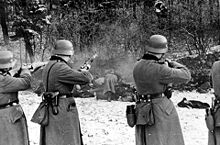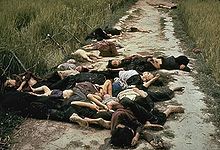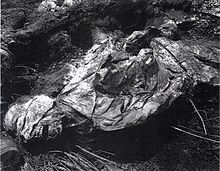- Massacre
-
 Massacre of 56 Polish citizens in Bochnia (near Kraków), perpetrated by German troops during the German occupation of Poland, December 18, 1939
Massacre of 56 Polish citizens in Bochnia (near Kraków), perpetrated by German troops during the German occupation of Poland, December 18, 1939
 Some of the 347 men, women and children massacred at My Lai, South Vietnam by a unit of the United States Army on March 16, 1968
Some of the 347 men, women and children massacred at My Lai, South Vietnam by a unit of the United States Army on March 16, 1968
A massacre is the general and unnecessary slaughter of members of one group by one or more members of another more powerful group. A massacre may be indiscriminate or highly methodical in application. The massacred group may be humans or animals. A massacre is a single event, though it may occur during the course of an extended campaign or war. A massacre is separate from a battle (an event in which opposing sides fight), but may follow in its immediate aftermath, when one side has surrendered or lost the ability to fight, yet the victors persist in killing their opponents.
The term massacre is derived from the Latin term "mass sacrifice", being the term used to describe a mass-killing for the prosecutor's or prosecutors' personal gain. The idea itself is also used for certain events in history,[1] which may or may not be agreed on by all reasonable definitions, but may serve propaganda purposes. The first recorded use in English of the word massacre in the name of an event is "Marlowe (c1600), The massacre at Paris"[1] (a reference to the St. Bartholomew's Day massacre). Massacre can also be used as a verb, as "To kill (people or, less commonly, animals) in numbers, esp. brutally and indiscriminately",[2] the first usage of which was "1588 J. PENRY Viewe Publ. Wants Wales 65 Men which make no conscience for gaine sake, to breake the law of the æternall, and massaker soules...are dangerous subjects".[2] It is also used figuratively and idiomatically for events that do not involve any deaths, such as the Saturday Night Massacre, which refers to the firing and resignations of political appointees during the Watergate scandal.
Massacres can be difficult to investigate because they are often done secretly and the victims may all have been killed, so that only the perpetrators survive and are able to bear witness.[3] There are those who have observed that when an urban massacre is initiated by government authorities, such as what happened in Soweto in the 1980s, leaders of the massacred are usually not included in the toll, perhaps because leaders do not usually join in the street demonstrations they organize.[4]
See also
- List of events named massacres
- Mass murder
- Disaster
- Tragedy (event)
- Genocide
- Ethnic cleansing
- Killing spree
References
- ^ a b Oxford English Dictionary Massacre, n.
- ^ a b Oxford English Dictionary Massacre, v.
- ^ Jacques Semelin (2009), "Investigating a massacre", Purify and Destroy: The Political Uses of Massacre and Genocide, Columbia University Press, pp. 376–378, ISBN 9780231142830, http://books.google.co.uk/books?id=mwf-pHi_2I0C&pg=PA376
- ^ Ronald A. Francisco (2010), "After the massacre", Collective Action Theory and Empirical Evidence, Springer, ISBN 9781441914750, http://books.google.co.uk/books?id=2ziERyPaOOQC&pg=PA32
Lists of massacres List of events named massacres By country/location Afghanistan · Albania · Algeria · Argentina · Australia · Azerbaijan · Bangladesh · Belarus · Belgium · Bosnia and Herzegovina · Brazil · Bulgaria · Burma · Burundi · Canada · Chile · China · Colombia · Croatia · Cyprus · Czech Republic · Dominican Republic · East Timor · Egypt · El Salvador · France · Germany · Greece · Guatemala · Guinea · Guyana · Haiti · Iceland · India · Indonesia · Iraq · Ireland · Israel · Italy · Japan · Kenya · Kosovo · Latvia · Lebanon · Libya · Lithuania · Malaysia · Mexico · Nepal · New Zealand · Nigeria · North Korea · Palestinian Territories · Peru · Philippines · Poland · Romania · Russia · Rwanda · São Tomé and Príncipe · Serbia · Singapore · Slovakia · Slovenia · Solomon Islands · South Africa · South Korea · Soviet Union · Spain · Sri Lanka · Syria · Taiwan · Thailand · Turkey · Ukraine · United Kingdom · United States · Uzbekistan · Venezuela · Vietnam · Yugoslavia · At seaBy event By group This article about disaster management or a disaster is a stub. You can help Wikipedia by expanding it.

